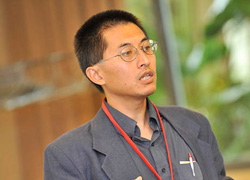IMDEA Networks

Deployment of mission-critical surveillance applications on wireless sensor networks

D Prof. Dr. CongDuc Pham, University of Pau (Pau, Francia)
Abstract:
A sensor is a device capable of monitoring physical or environmental conditions, such as temperature, sound, vibration, pressure, motion or pollutants. Sensor networks composed of hundreds, or sometime of thousands of nodes, are able to gather large quantities of information enabling dynamic large scale surveillance applications to be deployed. Most of surveillance applications have a high level of criticality and can not be deployed with the current state of technology. Besides military applications that possess an obvious criticality level and have a very specific usage, surveillance applications oriented toward Critical Infrastructures and disaster relief are also very important applications that many countries have identified as critical in the near future. In this presentation, we will present the challenges in deploying mission-critical surveillance applications and will present our latest works on criticaity modeling and management.
Short Bio:
CongDuc Pham obtained his PhD in Computer Science in July 1997 at the LIP6 Laboratory (Laboratoire d’Informatique de Paris 6), University Pierre and Marie Curie. He also received his Habilitation in 2003 from University Claude Bernard, Lyon, France. He spent one year at the University of California, Los Angeles (UCLA) as a post-doctoral fellow. From 1998 to 2005, he was associate professor at the university of Lyon, member of the INRIA RESO project in the LIP laboratory at the ENS Lyon. He is now professor at the University of Pau and has served as the director of the LIUPPA laboratory from 2006 to 2009. His research interests include parallel discrete event simulation, cluster computing, active networking, networking protocols, congestion control and wireless sensor networks. He has published more than 50 papers in international conferences and journals, has been reviewers for a numerous of international conferences and magazines, and has participate to many conference program committees. He has served as co-editors for 2 special issues of international journals (Future Generation Computer Systems and Annals of Telecom). He has co-organized 2 workhops and gave 7 tutorials in international conferences. He is a member of IEEE.

La conferencia se impartirá en inglés
- Localización: Sala 4. 1F03, Departamento de Telemática, Edificio Torres Quevedo, Universidad Carlos III de Madrid, Avda. Universidad, 30, 28911 Leganés – Madrid
- Organización: NETCOM Research Group (Telematics Department, University Carlos III of Madrid, Spain); IMDEA Networks (Madrid, Spain)
- Hora: 01:00pm
- Add to Calendar: iCalendar Outlook Google

